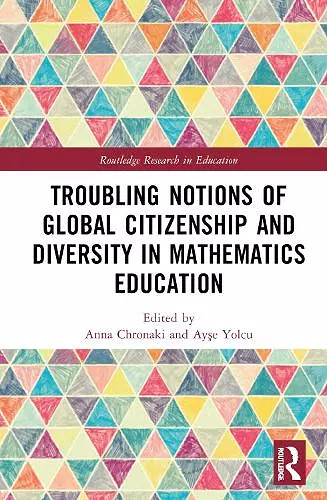Troubling Notions of Global Citizenship and Diversity in Mathematics Education
Anna Chronaki editor Ayşe Yolcu editor
Format:Hardback
Publisher:Taylor & Francis Ltd
Published:6th Mar '25
£145.00
Supplier delay - available to order, but may take longer than usual.

This edited volume explores how mathematics education is re/configured in relation to its past, present, and future when the rhetoric of critical global citizenship education is being applied to diverse local settings.
Drawing upon diverse theoretical and methodological traditions across the globe including countries in South America, Asia, Australia, and Europe, each chapter challenges and, eventually, troubles the wide circulation of a universal imagery of citizenship based on mathematical competence in not only curriculum, school reforms and policy but also in teaching and learning practices. Troubling the Euro-centric and global notions of citizenship and diversity, the book foregrounds local practices in mathematics education to portray a broader picture for the current problems of equity, social justice, and democracy. The book also engages with critical discussions on how ‘citizens’ and ‘noncitizen’ are being fabricated in the context of educational policies and specific mathematical practices.
First of its kind, to trouble what is at stake when mathematics education is framed within the discourses of citizenship globally (through challenging and problematising what is understood as ‘normal’), this book will be of relevance to scholars, academics, and researchers in the field of sociology of education, anthropology of education, philosophy of education, mathematics education, citizenship studies, and international and comparative education.
“This volume takes up important ideas of globalization and citizenship that have been dismissed as irrelevant to mathematics education. The authors bring mathematics education into conversations about inclusion and exclusion that are both locally and globally relevant and that directly affect how people engage with mathematics as a tool of globalization.”
Erika C. Bullock, University of Wisconsin-Madison, United States
“In the global context, the concept of citizenship has been shown to be highly unstable. Troubling Notions of Global Citizenship and Diversity in Mathematics Education, is the first edited volume produced to explore this phenomenon from the perspective of mathematics educational thinkers. This is exciting and insightful work, with profound implications for theory, research and practice within the field.”
Professor Emerita Margaret Walshaw, Massey University, New Zealand.
“Critical mathematical citizenship is the desired goal of critical education for mathematics. But who or what is the citizen? This valuable book troubles global discourses of citizenship and their power, performativity and normativity in society. It reveals how, worldwide, mathematics participates in fabricating ‘citizens’ and ‘noncitizens’ in troubling ways, not always empowering or just.”
Paul Ernest, Emeritus Professor of Mathematics Education, University of Exeter, United Kingdom.
“This volume takes up important ideas of globalization and citizenship that have been dismissed as irrelevant to mathematics education. The authors bring mathematics education into conversations about inclusion and exclusion that are both locally and globally relevant and that directly affect how people engage with mathematics as a tool of globalization.”
Erika C. Bullock, University of Wisconsin-Madison, United States.
“In the global context, the concept of citizenship has been shown to be highly unstable. Troubling Notions of Global Citizenship and Diversity in Mathematics Education is the first edited volume produced to explore this phenomenon from the perspective of mathematics educational thinkers. This is exciting and insightful work, with profound implications for theory, research and practice within the field.”
Margaret Walshaw, Massey University, New Zealand.
“Critical mathematical citizenship is the desired goal of critical education for mathematics. But who or what is the citizen? This valuable book troubles global discourses of citizenship and their power, performativity and normativity in society. It reveals how, worldwide, mathematics participates in fabricating ‘citizens’ and ‘noncitizens’ in problematic ways, not always empowering or just.”
Paul Ernest, University of Exeter, United Kingdom.
ISBN: 9780367672942
Dimensions: unknown
Weight: 770g
308 pages